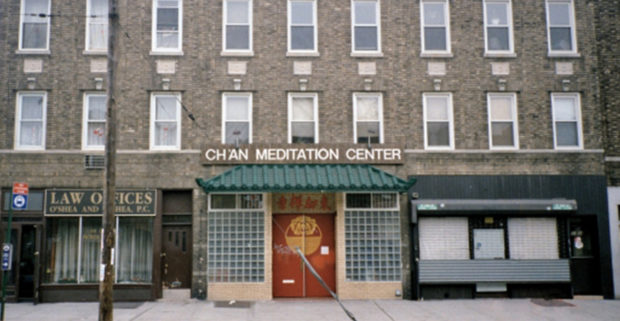
A Buddhist passed away in New York City.
His funeral was two weeks ago. Only a limited number of family members were allowed at the scene because of the pandemic. Master Chang Xun and her “householders” from the Chen Meditation Center in Queens were unable to attend, so they decided to go online and chant with the family at the funeral service. Buddhists believe that the soul can be released from purgatory through religious changing.
The long-distance chanting at the funeral was only one way that the Chen Meditation Center, located at Corona Ave in Queens, has been coping with the pandemic that swept through the globe over the last two years.
Chan Meditation Center in Queens, New York City. Photo courtesy: Chan Meditation Center’s official website.
At first, the center, like many other houses of worship, closed its doors. It gradually resumed its regular activities by holding hybrid classes and services, both online and in-person. On Sunday evenings, about a dozen members gathered in their temporary “Bodhimaṇḍa”, a place of enlightenment for Buddhists to sit down and meditate, which usually has one or more Buddha statues in it to watch the 2020 movie “The Father”–and discussed it after the screening. The film, starring Anthony Hopkins, is about an aging man who must deal with his progressing dementia. Half of the members sat in a circle, talking, while others were busy preparing homemade marshmallow cookies beside the window. At the end of the hall, a golden statue of Buddha sat quietly, staring at people from on high. A robot vacuum wandered leisurely on the floor below his feet.
Chang Xun said that online classes have actually increased the center’s audience. “Around 70 to 80 people attend online classes and meditations,” Chang Xun said. “Comparing to 30 people in the old days when we were meeting in person.”
Ming Shi, a householder at the Chen Meditation Center, said that online Dharma classes allow her to listen to different Master’s classes from different places. “We invited Master Sheng Dian’s disciple in Europe to discuss Dharma this Sunday since there are no geographical restrictions online.”
However, Masters, householders, and other participants are all hoping the activities can soon resume in person, especially because of the lack of empathy when talking online. “We cannot see each other’s facial expression clearly”, said Chang Xun. She’s also concerned that online classes have a strict time limit of one hour, while they can go longer when meeting in person.
Shi, as one of the organizers of young Buddhists’ classes in the New York area, worried about how sincerely young Buddhists can learn from online classes and chanting: “I don’t feel elderly Buddhists affected by the online classes very much. Young people did. Because there are lots of distractions in your life. if you are physically going to the meditation center and learning with others, you don’t have the chance to do other things, but you might do other things simultaneously when learning online.”
Despite online classes, Master Chang Xun must also cope with the lack of volunteers in the center during the pandemic. Usually, some familiar participants and householders in the center served as volunteers to cook vegetarian meals, do cleanings, and organize events, but during the pandemic, some volunteers cannot come to the center very often. Chang Xun herself had to take all their jobs.
That wasn’t too bad until one day she had to go to the market.
Chang Xun, like many Buddhists, is a strict vegetarian. She accidentally walked through several meat stalls in the market to get to the stalls that sell vegetables. She smelt the odor of fish and meats, and can’t stop thinking about when they were still alive. “I almost cried,” She said. “I can’t stand their suffer.”
The day after she had come back from the market, Master Chang Xun still thought about these creatures, even when she was teaching Dharma classes. “I can still smell them,” she said. She made a special prayer for the livestock she encountered at the market.
Now, Chang Xun seemed not to have to struggle anymore. Volunteers are coming back these days as the positive cases in New York started decreasing. The center expects more volunteers to come back in the following month.
However, their coping moments never cease. To Buddhists, Dharma itself is the way that they are trying to cope with any new situation in their lives–Asian hate crime, diseases, kindness, wars… etc.—even though this situation seems to violate their belief.
